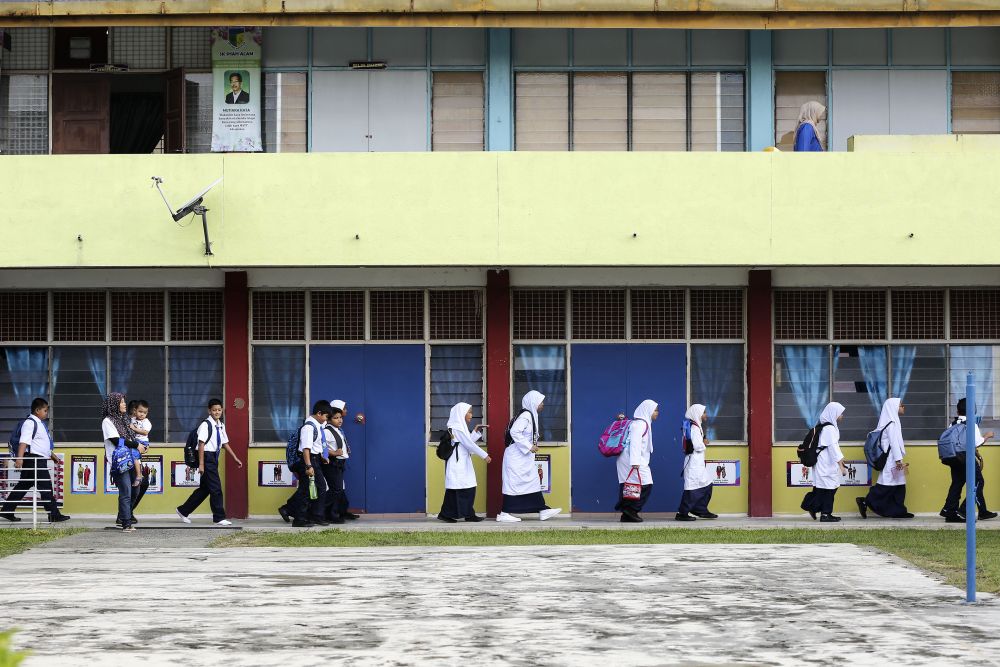KUALA LUMPUR, March 31 — Parent groups have lauded Tun Dr Mahathir Mohamad’s aim to completely revamp public education, but cautioned the prime minister about monumental challenges.
Parent Action Group for Education (PAGE) chair Datin Noor Azimah Abdul Rahim said although the call to make national schools more appealing is commendable, the process to do so is more daunting.
She said if any serious attempts to revamp national schools are to be successful, the government must look at treating educators as a professional body and as an accountable and proficient workforce.
“The teaching profession should be treated like any other professional body. It simply means if you don’t perform, then you are out.
“The issue comes down to accountability. Educators are supposed to give quality education but sadly, this is not happening,” she told Malay Mail, adding that even absenteeism has become an issue among teachers.
Noor Azimah admitted that punitive action might seem severe, but felt it was crucial in dislodging irresponsible educators.
Another critical move is to ensure that educators have a clear professional career path with continuous development, said Noor Azimah.
“They need continuous professional development but there is no proper structure of it happening at the moment. This leads to teachers not teaching correctly, especially when it comes to technical subjects like additional mathematics and chemistry among others,” she said.
However, Noor Azimah said she understood that public school teachers have a huge responsibility and often had to deal with needless bureaucracy.
“Ideally, teachers should handle smaller classrooms but this might seem difficult to do with national schools. The best is for the Education Ministry to look into ways to reduce their workload,” she said.
Melaka Action Group for Parents in Education chairman Mak Chee Kin thinks that bringing back English medium schools would be the best way to make national schools better.
“I think the only way is to bring back English medium schools. At one stage, all the science subjects are in English, then certain subjects would be in Bahasa Malaysia. Of course, we cannot neglect Bahasa Malaysia, that’s our national language.
“If parents can afford it, they would send their children to a private or international school because they are all in English. If they cannot afford it, they would send their children to vernacular schools,” he said.
“As what Dr Mahathir said, do not make it too religious-centred in national schools. Religions should be studied at their own accord, in afternoon schools or something like that, which they are practising now. Do not make it too religious. This makes non-Muslims shy away from all those SK schools,” he added.
Mak also concurred with Noor Azimah that public schools need better teachers but also pointed out that the number of teachers being deployed to schools needed to be reviewed.
He explained that the number of teachers being deployed to schools was based on how many classes are held and not on the number of students.
According to Mak, teachers are assigned to schools based on a formula of one classroom equals to 1.5 teacher.
Although a classroom consists of an average 30 pupils, the numbers could swell up to nearly 40 depending on the location of the school.
This could lead to certain schools having fewer teachers to effectively handle the students.
“Educators would then be less effective to teach in a large classroom. The powers that be must relook into this redeployment policy,” he added.
Another major issue is that as the world moves to embrace digitalisation, public schools too need to have the proper infrastructure to meet such needs.
“There is no way to escape digitalisation. The government must ensure that all schools, especially those in rural and financially challenging areas, have the right digital infrastructure for their students.
“What is most important is making sure that all students receive their fair share and equal opportunity to succeed,” he said.
“Of course, the government must be willing to invest heavily and constantly in public education,” he added.
Dr Mahathir recently said larger reforms in education were on the way to make national schools “great again”, in order to create a quality workforce that will ensure the sustainability of the national economy.
The prime minister said a special task force had been formed to review national education policies in their entirety, from preschool to tertiary education, with the findings due for completion next month.



















